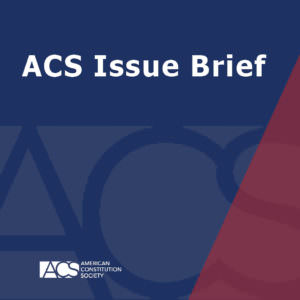Racial Disparities in Capital Punishment: Blind Justice Requires a Blindfold
Associate, Winston & Strawn LLP
 ACS is pleased to distribute an Issue Brief by Scott Phillips, Associate Professor in the Department of Sociology and Criminology, University of Denver, entitled Racial Disparities in Capital Punishment: Blind Justice Requires a Blindfold. In this Issue Brief, Professor Phillips describes research he conducted on race and capital punishment in Harris County, Texas. The author reports finding that the death penalty is more likely to be imposed against black defendants than white defendants, and death is more likely to be imposed on behalf of white victims than black victims. Professor Phillips explains that his research indicates that the racial disparities arise in the District Attorney's decision to seek the death penalty, rather than with the jury. He suggests that because the Supreme Court is unlikely to overrule McCleskey v. Kemp in the near future and find that capital punishment is unconstitutional based on statistical evidence of racial disparities, other means for reducing racial disparities in the death penalty should be implemented. He proposes that prosecutors' offices that want to institute genuine race-blind processes for deciding whether to seek the death penalty should consider "desocializing" the decision to seek the death penalty. Concrete steps that District Attorney's offices can take to reduce the social information available to judicial actors in the capital litigation process, he suggests, include eliminating information that might insinuate the race of the victim or defendant - "racial markers" - from all documents considered in the District Attorney's decision whether to seek the death penalty.
ACS is pleased to distribute an Issue Brief by Scott Phillips, Associate Professor in the Department of Sociology and Criminology, University of Denver, entitled Racial Disparities in Capital Punishment: Blind Justice Requires a Blindfold. In this Issue Brief, Professor Phillips describes research he conducted on race and capital punishment in Harris County, Texas. The author reports finding that the death penalty is more likely to be imposed against black defendants than white defendants, and death is more likely to be imposed on behalf of white victims than black victims. Professor Phillips explains that his research indicates that the racial disparities arise in the District Attorney's decision to seek the death penalty, rather than with the jury. He suggests that because the Supreme Court is unlikely to overrule McCleskey v. Kemp in the near future and find that capital punishment is unconstitutional based on statistical evidence of racial disparities, other means for reducing racial disparities in the death penalty should be implemented. He proposes that prosecutors' offices that want to institute genuine race-blind processes for deciding whether to seek the death penalty should consider "desocializing" the decision to seek the death penalty. Concrete steps that District Attorney's offices can take to reduce the social information available to judicial actors in the capital litigation process, he suggests, include eliminating information that might insinuate the race of the victim or defendant - "racial markers" - from all documents considered in the District Attorney's decision whether to seek the death penalty.
Read the full Issue Brief here: Phillips_Issue_Brief
